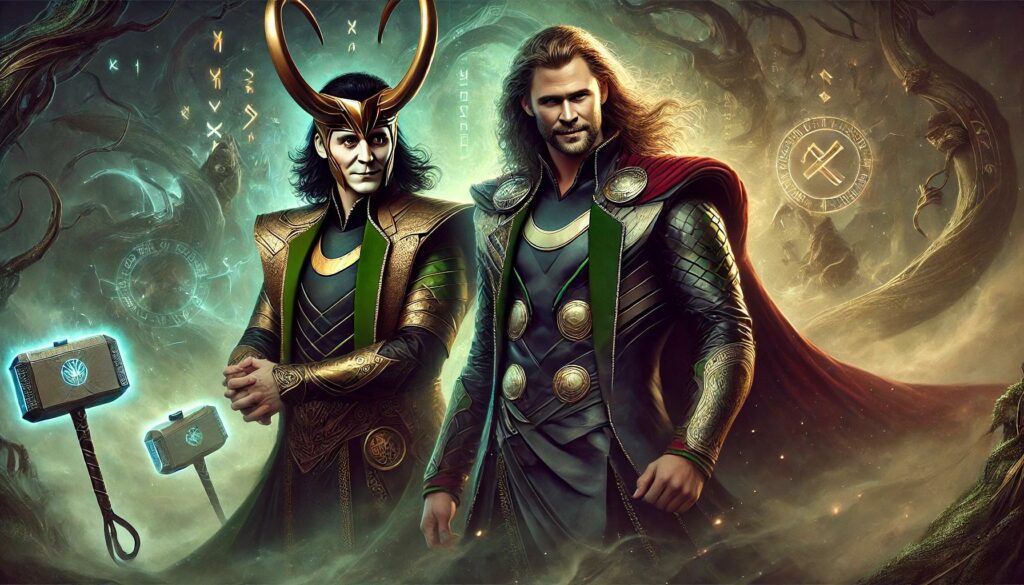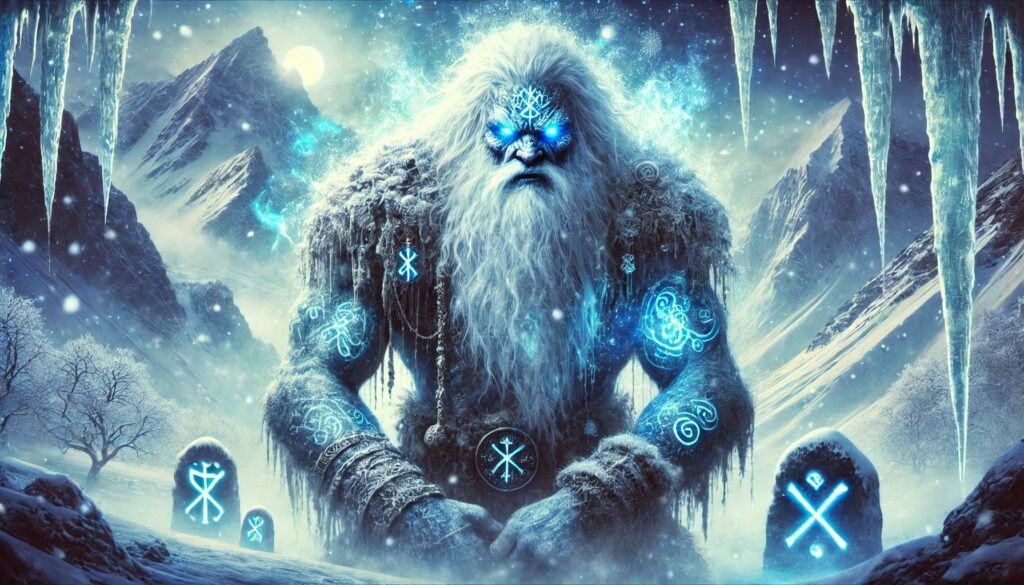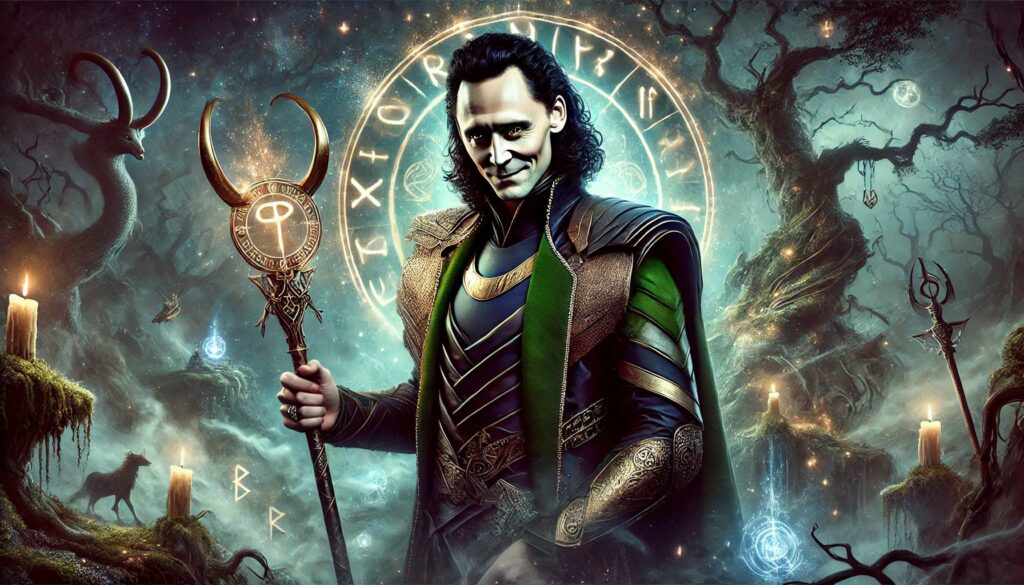Aesir Gods, Giants (Jötunn), Loki, Norse Gods, Norse Mythology, Odin, Thor
Who Is Loki’s Father – The Mythical Heritage of the Trickster God
In Norse mythology, Loki is a key figure as the trickster god, often causing problems for the Norse god Thor. He’s famous for his cleverness and mischief. To truly understand Loki, knowing about his family background is essential. This roots back to tales found in the Poetic Edda and the Prose Edda, which also feature Odin and other Norse gods.
Loki’s lineage is fascinating and adds depth to his character, particularly his ties to Laufey’s and Loki’s mother. It also sheds light on the connections and stories within Asgard. His parents’ story is particularly complex, showcasing his mysterious persona and its impacts. So, who is Loki’s mother and father? Keep reading this article to find out.
Who is Loki, and What is His Role in Norse Mythology?
Loki stands out in Norse mythology for many reasons. He is a mix of trickster and shape-shifter, often causing trouble for Thor and the other Asgardians. These traits make him both interesting and unpredictable to the gods, particularly to the Norse gods and goddesses. While seen as a god, Loki’s nature separates him from the typical divine beings in the Norse stories, unlike the other Norse gods and goddesses.
Loki’s Influence in Norse Mythology
Loki’s tales are key to Norse mythology, shedding light on his interactions with Odin and other Norse gods. He is known for his cunning and love of mischief. He starts chaos but also helps solve problems, maintaining a kind of balance, much like his role in the Marvel Cinematic Universe. Loki’s theft of Idun’s apples and his part in building Asgard’s walls are notable examples.
Connections Between Loki and Other Norse Deities
Loki’s ties with others in Norse mythology are complicated, particularly his relationship with his mother and Laufey’s lineage. He earns Odin’s respect through his cleverness. His relationship with Thor is filled with ups and downs, mixing rivalry with brief alliances. Loki plays with fate, affecting gods and goddesses like Frigg and Tyr to his benefit or their loss, showing his unique and disruptive place in the myths as Loki, Thor’s brother.
Loki’s Trickster Nature and Mischief
At his core, Loki is the ultimate trickster, a role he plays both among the gods of Asgard and in the Marvel Cinematic Universe. He uses his ability to change shape to trick his peers. His mischief carries both light-hearted and deeper meanings, sometimes with unclear intentions, affected by his feelings of being Laufey’s son. While known for causing trouble, Loki’s intellect and resourcefulness keep him vital in Norse stories, contributing to the dynamics of conflicts and their resolutions.
What is the Relationship Between Loki and Thor?
In Norse mythology, the bond between Loki and Thor is complex. Thor, the god of thunder, and his adopted brother, Loki, both Odin’s sons, engage in friendly and rival interactions. Their stories show a mix of teamwork and opposition, reflecting the complex dynamic between Thor and Loki.

Loki and Thor’s Dynamic Relationship in Norse Mythology
As essential Norse figures, Loki and Thor often go on adventures. Their trips showcase how different personalities can unite to overcome challenges. For instance, their trip to Jotunheim highlights how Thor’s brawn and Loki’s wit can combine effectively.
The Sibling Rivalry Between Loki and Thor
Loki and Thor’s brotherly rivalry is a key theme in Norse myths. This is due to their varying characteristics, with Thor symbolizing strength and honor and Loki struggling with his identity as Loki Thor’s brother. Loki’s feelings of being an outcast and his unresolved emotions towards his biological father lead to tensions in their dynamic.
These conflicts, driven by jealousy and Loki’s feelings of not belonging among the Asgardians, often thwart Thor’s efforts. This ongoing rivalry portrays the depth of their relationship in Norse folklore.
Who is Loki’s Father in Norse Mythology, and What is His Mythical Heritage?
To truly understand Loki, one must explore his roots, especially his relationship with his biological father. Knowing who is Loki’s father Norse mythology is critical. It shows much about Loki’s nature and why he does what he does.
Exploring the Identity of Loki’s Father
Loki’s father is Fárbauti, a giant of great power. His name means “Cruel Striker” or “Dangerous Hitter” in Norse. He’s a key figure in Norse tales, known for his wild and fierce nature and his connections to the Norse gods and goddesses.

The Intriguing Origins of Loki as a Frost Giant
Loki is a frost giant from Jotunheim, which adds an interesting twist to Norse mythology. Son of Fárbauti and Laufey, Loki, who is also known as the son of Odin in some stories, has a unique mix of giant and divine blood. This heritage makes him stand out in the Norse pantheon.
Loki’s Relationship with His Father and the Impact on His Actions
Loki’s father, Fárbauti, plays a big role in his life. The clash between Loki’s giant background and his role among the Aesir gods shapes his actions. Loki’s complex parentage causes his mischievous and untrustworthy ways. It’s a big factor in his adventures and deceit, especially in his interactions with Sif, Sigyn, and other Asgardians.
Comparing Loki’s Portrayal in Norse Mythology and the Marvel Universe
Loki is a unique character in both Norse mythology and the Marvel Universe. In Norse myths, he is a god of mischief, known for his cunning ways. He often tricks the other gods, bringing both trouble and help.
Marvel’s interpretation has made Loki even more memorable. He’s a complex figure, teetering between good and bad, beloved by fans. Actor Tom Hiddleston has brought Loki to life, making him a well-rounded, engaging character.
Loki’s Representation in Old Norse Texts and Legends
According to Norse mythology, Loki is a mysterious figure, not truly on the gods’ or giants’ side. Born from a giantess and a giant, he lives among the gods of Asgard. Loki’s stories often show his complex nature. For example, he trickled to the death of Baldr, showing the depth of his rivalry with the Norse gods and goddesses. Yet, he plays a crucial role in the end-of-the-world event, Ragnarok.
He is a shapeshifter known for his deceit. This shows how versatile and tricky he is. These qualities make his character both unpredictable and interesting.
Loki’s Transformation and Adaptation in Marvel Comics and Cinematic Universe
Marvel has taken the Norse trickster and made him a key player in its universe. Loki was first a villain but has since grown into a more complex character, depicted as the son of Odin in many stories. His journey in the MCU has further complicated his persona. The films have given him depth, exploring family, identity, and redemption themes. His stories have made him a favorite around the world.
Summary
In Norse mythology, Loki is a fascinating and complex character. He’s known for his tricks and for causing big changes. This article dives into Loki’s roles, from his wild acts in Norse stories to his ties with other gods. Loki is seen as starting chaos and also making things change.
Now, when we answer the question of who in Norse mythology is Loki’s father, it`s evident that Loki’s background is interesting because he comes from both gods and frost giants. His father links him to both these worlds, making Loki like a bridge. Discovering Loki’s interactions, especially with Thor, shows a strong rivalry that affects many myths.
It is eye-opening to compare how Loki is depicted throughout history to today. Loki remains a popular figure, from his roots in Norse tales to his more recent depictions in Marvel Comics and movies. These stories connect us to old beliefs and prove Loki’s stories are still captivating and relatable today.

